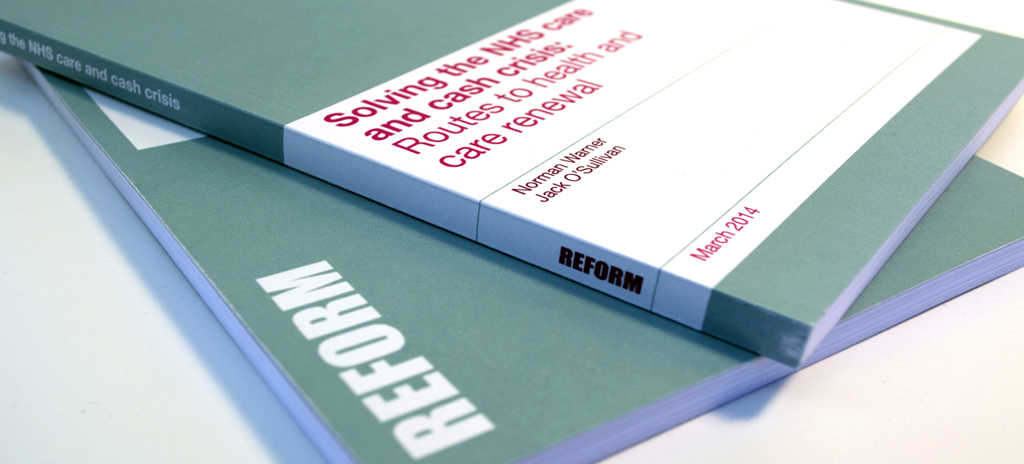Health and care reform

Solving the NHS Care and Cash Crisis:
‘Solving the NHS Care and Cash crisis: Routes to health and care renewal', is co-authored by Lord Norman Warner, Health Minister for NHS reform in the Blair Government, and Jack O’Sullivan.
Published in April 2014 by Reform, the independent think-tank, the 128-page report sets out a bold, but minimally disruptive, programme to improve health while increasing affordability and reducing pressure on other public services during the coming five years of planned austerity. It proposes the biggest change in the relationship between individuals and the State in healthcare - around co-produced health -since the foundation of the NHS.
The report is the most discussed publication by a think-tank so far this year. Every London-based national broadsheet and tabloid reported it and the authors took part in more than 25 radio and television interviews, including Sky News and BBC Radio Four’s ‘Today’ programme.
The Guardian published a Comment Page article, by the authors, entitled ‘£10 each can save the NHS’ . The BBC published our blog, entitled: ‘Should we pay a monthly membership fee to the NHS?'. Together, these pieces, alone, produced more than 2,000 on-line comments on the day.
The report recommends shifting investment into much improved community-based health; creating a new partnership between the NHS and citizens; concentrating specialist services on fewer sites; hypothecating extra tax funding; merging health and social care budgets and service delivery.
Jack O’Sullivan said: ‘Our proposals would prevent NHS from starving the rest of the public sector of resources, would bring health and care models up to date and ensure long-term financial sustainability for the NHS. Our plans don’t require another big reorganisation or lots of hospital closures. They focus the NHS on what it can do with you rather than on what it can do to you.’
Key recommendations include:
Radical partnership between State and citizen
- Everyone to gain NHS Membership entitling people of working age to an annual Health MOT, planning ‘co-produced’ health over the year. £10 per month membership fee collected with Council Tax to fund local preventative health care.
New National Health and Care Service (NHCS)
- Services refocused on early intervention in community for both managing chronic and mental health conditions and preventing illness. Many existing hospitals become hubs for integrated services closer to home. GP practices consolidated or federated.
- Integration of health and social care budgets and services, under Health and Wellbeing Boards.
- Specialist services concentrated in fewer, safer, more expert 24/7 centres plus improved transport links with community-based services.
- On 5 July, 'Health and Wellbeing Day', the new NHCS would provide a Citizens’ Audit, reporting on performance and costs plus a detailed local report on community, primary and social care services, and specialist hospital services.
Stricter financial discipline
- Tougher efficiency programme raising £15-20 billion to fund new Service Transition Fund (STF), allowing investment in new community health and care services. Efficiencies include converting under-used NHS estate to raise cash for STF.
- Attendance Allowance integrated into the health and care budget, saving £6 billion a year.
- NHS ‘Continuing Care’ becomes part of means-tested social care, saving up to £4 billion a year.
New funding methods
- NHCS funding from general taxation to be frozen in real terms.
- NHCS to receive 1 per cent increase per year above inflation, funded not from income tax but from:
- Tougher, hypothecated, inflation-proofed “sin” taxes on alcohol, tobacco and gambling and new taxes on health-damaging, sugary foods.
- Wider payment of inheritance tax.
- Inflation-proofing prescription and dental charges.
- 'Hotel charges' for overnight stays in hospital.
- Full cost holiday vaccination charges.